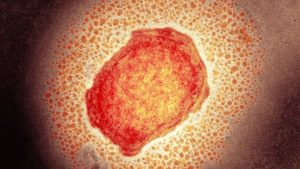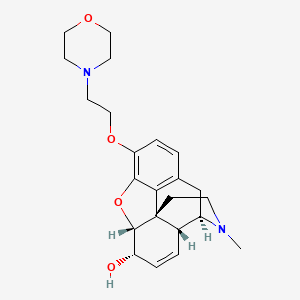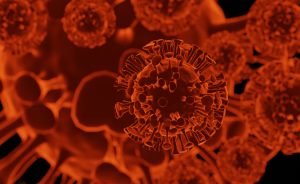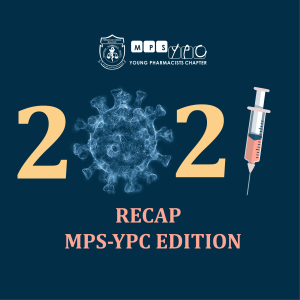It’ll be nice to help someone even after I’ve passed on
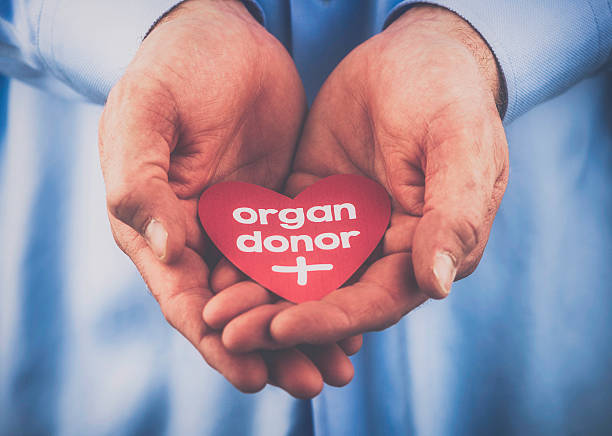
If the title somehow seems to resonate with you (bless you), you have come to the right place. While donating money or items posthumously seems like a wonderful idea, not many of us have that luxury. Which is why, donating your organs (healthy and functional ones of course) is a noble act all the same at the cost of almost nothing. Based on the report by International Registry of Organ Donation and Transplantation (IRODaT) in 2020, the living organ donors and actual deceased organ donors rate in Malaysia is 3.75 and 0.9 per million population respectively [1]. This is such a measly figure considering our population of over 32 million. It is likely that the numbers may dwindle over the years. Not many know the ins and outs of actually becoming an organ donor in our country. Here’s to hoping this article helps you in any way it can.
So, can anyone pledge to donate their organs ?
- Anyone is eligible except for those with infectious diseases such as Hepatitis B or C, Syphilis, HIV-AIDS etc
- Those aged 18 years and above; Individuals below the age of 18 require a written consent from their parents
Be sure to inform your family members or next of kin about your decision to donate your organs after you die as their consent may be required to carry out the donation after your passing and it will help the process to go on smoothly [2].
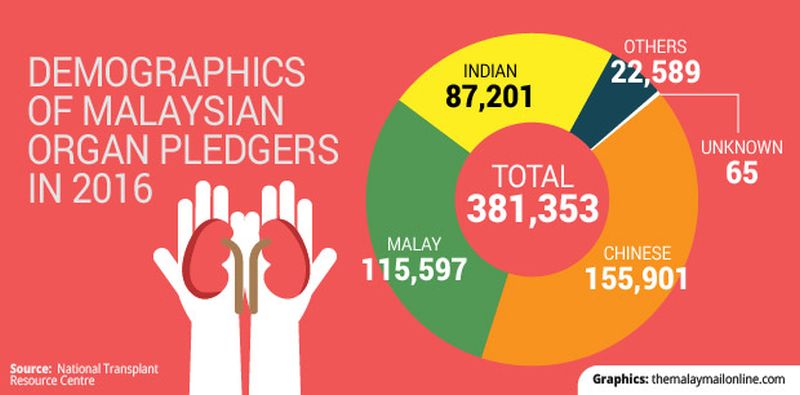
Sorry, but I don’t really get what organ donation means
Organ donation is essentially the act of removing the donor’s organ or tissue surgically and placing them into another individual, who will be the recipient. This process is known as transplantation and is usually done when the recipient has any of their organs or tissue injured or critically damaged such that it can no longer function normally [3].
In Malaysia, organs and tissues that can be donated are as follows:
- Organs:
- Lungs
- Heart
- Liver
- Kidney
- Tissue:
- Eyes (cornea)
- Heart valves
- Skin
- Bones
Wait.. so I’ve got to wait till my death for the organ donation to be carried out?
Not necessarily, donation of organs does not only happen after the donor is deceased, it can be done while the donor is still alive as well. Namely, there are two types of donation,
- Living organ donation
- Deceased organ donation.
For the former, as the name indicates, the donor would be alive when they choose to donate let’s say one of their kidneys or part of their liver. However, in Malaysia this type of donation can only be done for close blood relatives such as your identical twin, first/second degree relative or spouse. If you decide to donate to a recipient who is not genetically related to you, an Independent Committee (Unrelated Transplant Approval Committee [UTAC]) appointed by the Ministry of Health (MoH) will have to evaluate your decision to do so, upon which they will decide if the donation can proceed.
Deceased organ donation is where the pledged organs or tissues will be removed from the donor after their passing but only after the family member’s consent is obtained. In Malaysia, we practise an opt-in system with regards to organ donation whereby direct consent from the donor or their next-of-kin must be obtained before the organ removal can be done. This probably explains why our deceased organ donor rate is at 0.19 donors per 1 000 000 population despite various efforts to attract more organ donors [4].
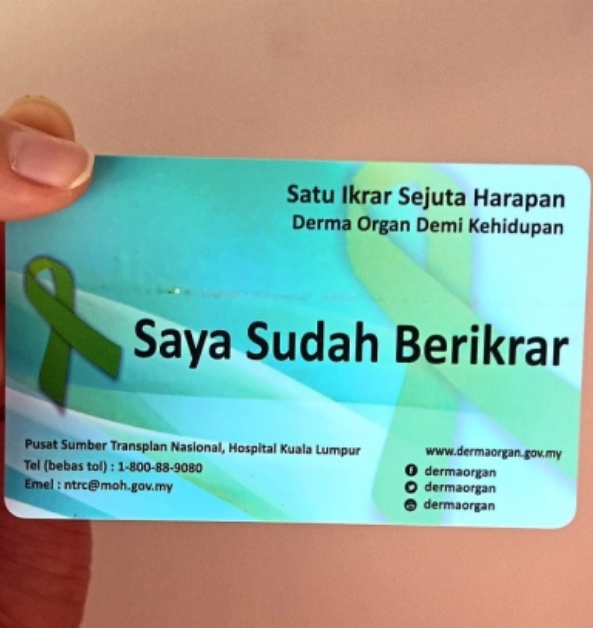
Okay, so how can I pledge to become a donor?
- Fill in the organ donor registration form & send it to this address
Those who wish to become deceased organ donors, can fill in the organ donor registration form available at all government hospitals, District Health Departments/Centres and Transplant Resource Centre in Ipoh, Penang and Johor central hospitals respectively. This form can also be obtained online at the National Transplant Resource Center’s website.
National Transplant Resource Center
(Pusat Sumber Transplan Nasional)
Hospital Kuala Lumpur, Jalan Pahang,
50586 Kuala Lumpur, Malaysia.
2. Online registration
Alternatively, you can also pledge to become a donor at dermaorgan.gov.my by just filling in a Google form with all the required details. You would most probably receive your organ donor pledge card posted to you within four to six weeks.
3. Organ donation drives
If the previous two options don’t really appeal to you, you could always follow Derma Organ on their social media accounts (Facebook, Instagram, Twitter) and pledge by directly walking-in to one of their organ donation drives [5]
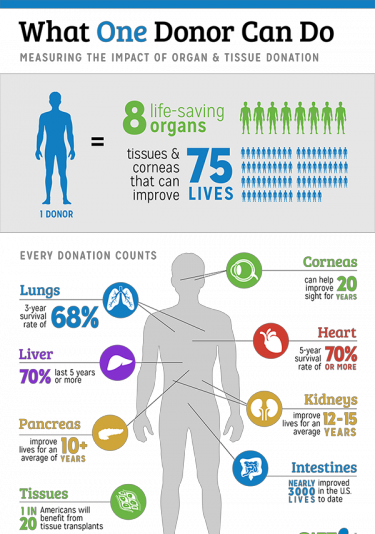
While there are not many recent statistics of the survival rate of organ transplant recipients in Malaysia, the one year allograft transplant survival rate for deceased and living donor kidney transplants are promising at 85% and 96% respectively [6]. Safe to say that organ donors are giving an invaluable gift to the recipients by prolonging their lives.
Tell me about some good-to-knows before I decide to be an organ donor
- Although you are an organ donor, your cause of death determines which of your organs are suitable to be donated
- The compatibility (eg.blood/tissue type, organ size) between the donor and recipient will be checked prior to the transplantation to avoid any risk of rejection
- Donating your organs or tissues does not require you to pay for anything
- Majority of the religions are in support of organ donation as it is a noble act of giving to save lives
- Should you pass away in a government hospital, the hospital bills incurred from the date of admission till death will be exempted since you are an organ donor
- You can choose whether you want your identity to be revealed to the organ recipient. Otherwise, details about the donor will be kept confidential from the recipient
*For more information on organ donation, you can visit the website of the National Transplant Resource Centre at www.dermaorgan.gov.my or call toll free 1-800-88-9080 or email to ntrc@moh.gov.my.
References
- Irodat.org. 2022. IRODaT – International Registry on Organ Donation and Transplantation. [online] Available at: <https://www.irodat.org/?p=database> [Accessed 7 May 2022].
- Mohd Nor, A., 2014. Organ Donation – PORTAL MyHEALTH. [online] PORTAL MyHEALTH. Available at: <http://www.myhealth.gov.my/en/organ-donation-2/#:~:text=Those%20who%20wish%20to%20donate,Centre%2C%20Hospital%20Penang%2C%20Transplant%20Resource> [Accessed 5 March 2022].
- Cleveland Clinic. 2021. Organ Donation and Transplantation: How it works. [online] Available at: <https://my.clevelandclinic.org/health/articles/11750-organ-donation-and-transplantation> [Accessed 5 March 2022].
- Naghavi, N., Mubarik, M., Rasiah, R. and Sharif Nia, H., 2020. <p>Prioritizing Factors Affecting Deceased Organ Donation in Malaysia: Is a New Organ Donation System Required?</p>. International Journal of General Medicine, [online] Volume 13, pp.641-651. Available at: <https://www.dovepress.com/prioritizing-factors-affecting-deceased-organ-donation-in-malaysia-is–peer-reviewed-fulltext-article-IJGM#:~:text=Similarly%2C%20regardless%20of%20serious%20efforts,lists%20of%20organ%20recipient%20candidates> [Accessed 5 March 2022].
- Balakrishnan, N. and Ang, M., 2021. How To Register To Be An Organ Donor In Malaysia. [online] SAYS. Available at: <https://says.com/my/lifestyle/organ-donation-in-malaysia> [Accessed 5 March 2022].
- Islahudin, F., Shahdan, I. and Kua, L., 2021. Kidney donation: bridging the gap in the shortage of kidney transplants in Malaysia. Journal of Health Research, 36(2), pp.354-364.
The opinions expressed in the article are the writers’ own and do not reflect the view of MPS YPC.





